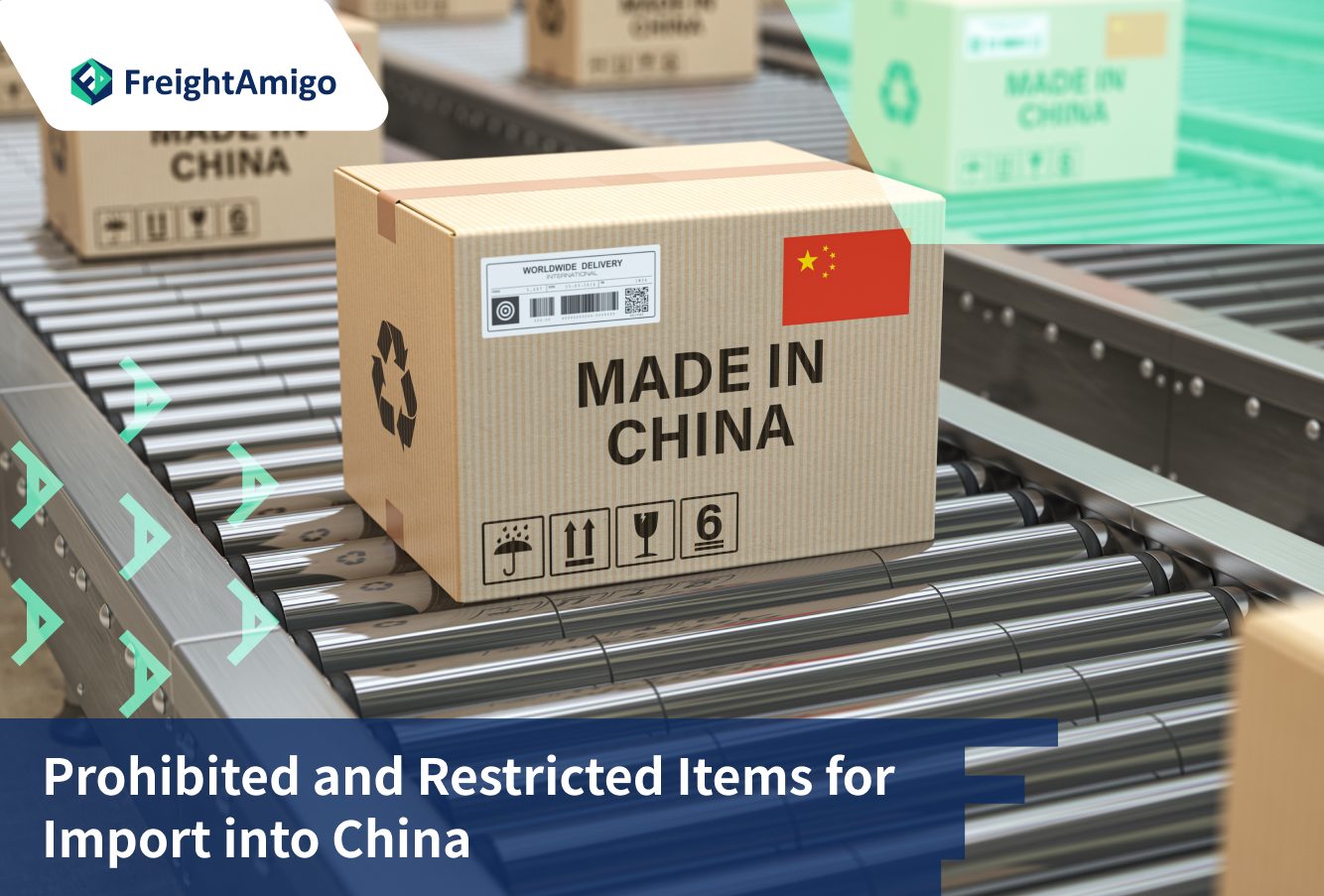January 19th, 2024: Aurora Park – Marketing Analyst at FreightAmigo
Importing goods into China requires careful consideration of the country’s regulations on prohibited and restricted items. This article provides a comprehensive overview of the rules and restrictions imposed by the Chinese government on imports, ensuring that businesses and individuals can navigate the import process with confidence. From firearms and hazardous materials to certain food items and cultural relics, understanding what is prohibited and restricted is crucial for a successful import operation in China.
Want To Compare The Best Express, Air Freight, Sea Freight, Rail Freight & Trucking Rates So As To Have Better Control On Cost?
-
Introduction
China has specific regulations on importing certain goods, including prohibited and restricted items. These regulations aim to protect the country’s political, economic, cultural, and moral interests, as well as public health and safety. Understanding and adhering to these regulations is essential for anyone involved in the importation of goods into China.
-
Prohibited Imports
Arms, Ammunition, and Explosives
China strictly prohibits the importation of arms, ammunition, and explosives of all kinds. These items pose significant risks to national security and public safety and are strictly controlled by the government.
Counterfeit Currencies and Negotiable Securities
Importing counterfeit currencies and negotiable securities is strictly prohibited in China. The circulation of counterfeit currencies undermines the stability of the financial system and is considered a criminal offense.
Harmful Printed Matter, Media, and Photographs
Printed matter, magnetic media, films, or photographs that are deemed detrimental to China’s political, economic, cultural, and moral interests are prohibited from entering the country. This includes materials that promote violence, pornography, or any content that goes against China’s values and principles.
Lethal Poisons and Illicit Drugs
China prohibits the importation of lethal poisons and illicit drugs. These substances pose significant risks to public health and safety and are subject to strict control measures.
Disease-Carrying Animals and Plants
To prevent the spread of diseases, China prohibits the importation of disease-carrying animals and plants. These restrictions aim to protect the country’s agriculture, environment, and public health.
Goods from Disease-Stricken Areas
Importing goods, including foods, medicines, and other articles, from disease-stricken areas is prohibited in China. This measure aims to prevent the spread of diseases and protect public health.
Used Garments and Local Currency
China prohibits the importation of old or used garments. Additionally, the importation of the local currency, Renminbi (RMB), is strictly prohibited.
Food Items with Harmful Additives
China restricts the importation of food items containing certain food colorings and additives deemed harmful to human health by the National Health and Family Planning Commission (NHFPC). These restrictions aim to protect consumers from potentially dangerous food products.
-
Restricted Imports
In addition to the prohibited items, China also imposes restrictions on certain commodities related to the processing trade. The “Catalogue of Commodities Which are Restricted or Prohibited from Importing for Use in the Processing Trade” helps shift China’s processing trade towards commodities with higher technological content and greater value-added potential.
Processing Trade Commodities
The “Catalogue of Commodities Which are Restricted or Prohibited from Importing for Use in the Processing Trade” lists commodities that are restricted or prohibited for use in the processing trade. This measure encourages the importation of commodities with higher technological content and greater value-added potential.
Publications
China restricts the importation of publications with licentious content. These measures aim to protect domestic industries and promote the circulation of new products.
Radioactive or Harmful Industrial Waste
Importing radioactive or harmful industrial waste is restricted in China. These restrictions protect the environment and public health from the hazards associated with such waste.
Junk Cars, Used Automobiles, and Components
China restricts the importation of junk cars, used automobiles, and components. This measure aims to promote the development of the domestic automobile industry and ensure the safety and quality of imported vehicles.
Agricultural Products and Additives
Certain agricultural products, including seeds, seedlings, fertilizers, feed, additives, and antibiotics used in cultivation or breeding, are restricted from importation. These restrictions ensure the safety and quality of agricultural products in China.
Restricted Steel Products
China restricts the importation of certain steel products. These restrictions aim to protect domestic steel industries and ensure fair competition in the market.
-
Wood Packaging Requirements
All wood packages imported into China must carry an International Plant Protection Convention (IPPC) mark. This mark signifies that the wood packaging materials meet the standards set by the Measures for the Administration of Quarantine and Supervision of Wooden Packages of Imported Goods. Failure to comply with these requirements may subject the packages to further inspections and potential delays.
-
Scrap Material Renewal Procedures
For the importation of scrap materials, China has specific renewal procedures that must be followed. The General Administration of Quality Supervision, Inspection, and Quarantine (AQSIQ) issued a notice regarding the renewal procedures for the license and registration of overseas enterprises dealing with imported scrap materials. The application materials must be submitted to the Division of Inspection & Supervision at the address specified in the notice.
-
Contacting China General Administration of Customs
It is essential for U.S. firms to contact the China General Administration of Customs for guidance regarding the importation of prohibited or restricted products. The China General Administration of Customs can provide the most up-to-date information and assistance in navigating the import process.
-
Conclusion
Importing goods into China requires a thorough understanding of the regulations on prohibited and restricted items. By adhering to these regulations, businesses and individuals can ensure compliance with Chinese law and avoid potential penalties or delays. It is crucial to stay informed about the latest updates and consult with the appropriate authorities to ensure a smooth importation process. With the right knowledge and preparation, importing goods into China can be a successful venture.
There Are Different Options For Cargo Transportation. If You Want To Choose The Most Convenient And Suitable Solution, It Is Best To Have The Full Support Of Logistics Experts! If You Are Planning To Ship Goods Overseas, Please Go To The FreightAmigo Page For Inquiries.
===
Read More:
【Import and Export Insights for 2024】 Exploring New Opportunities in Emerging Markets
China’s Export Boom: How to Tap into this Lucrative Trade Opportunity
Unfurling the New Trade Routes: China’s Export Expansion into Emerging Markets
===
If you have any inquiries on logistics/supply chain, feel free to contact FreightAmigo now:
Chat with us online OR Phone : +852 28121686 OR WhatsApp: +852 27467829









































